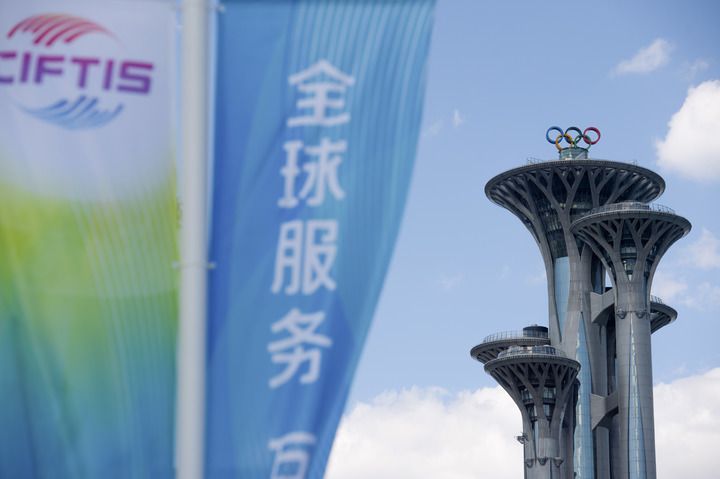Abstract : Beijing municipal authorities are accelerating the development of the city's "two zones," introducing a slew of business-friendly policies and continuing the city's opening up to the outside world.

Photo
taken on Sept. 9, 2020 shows the slogan “Global Services” printed on
the flag near the main venue of the 2020 China International Fair for
Trade in Services (CIFTIS) in Beijing, capital of China. (Xinhua/Chen
Zhonghao)
BEIJING, June 2 (Xinhua) — Beijing municipal authorities are accelerating the development of the city’s “two zones,” introducing a slew of business-friendly policies and continuing the city’s opening up to the outside world.
The “two zones” refer to the pilot free trade zone and the national comprehensive demonstration zone for expanding opening-up in the service sector.
In 2015, Beijing became the only pilot city in the country to open the service industry wider, and in 2020, the central government offered support for Beijing to become a national comprehensive demonstration zone of service industry opening-up. The China (Beijing) Pilot Free Trade Zone was officially unveiled in September 2020.
Against this background, many policies have been formulated to encourage innovation and entrepreneurship, advocate opening-up in finance, and introduce talent, among others. Among the 251 policies for developing the “two zones,” 140 policies had been implemented by the end of March 2021, including 12 pilot policies.
CUSTOMS CLEARANCE
Among the local enterprises benefiting from such policies is the Aircraft Maintenance and Engineering Corporation (AMECO) based in Beijing Capital International Airport, which makes good use of the city’s new facility for one-day customs clearance in comprehensive bonded zones.
Some airline companies outsource their engine maintenance, but maintenance enterprises on the Chinese mainland have to export engines to Hong Kong and then import them back again to claim for tax exemption, offset or refund, which is time-consuming and involves risks during transportation.
To tackle this issue, the tax department and relevant local government coordinated to put forward a customs-clearance policy for tax exemption, offset or refund in comprehensive bonded zones, and it has already been implemented in the Tianzhu comprehensive bonded zone in Beijing’s Shunyi District.
Han Keping, deputy general manager of the finance department at AMECO, said, “Since the policy was launched, AMECO has saved about 8 million yuan (about 1.24 million U.S. dollars) in engine maintenance freight, and the maintenance cycle has been shortened by over 400 days. Our corporation also plans to further explore the tax-refund service concerning other air-materials.”
EFFICIENCY IMPROVED
Favorable policies have taken shape in many other areas.
In the financial sector, an RMB international investment-and-loan fund has been approved in Beijing. In the medical sector, the first eight pilot hospitals in Beijing providing medical services for foreigners are advancing real-time settlement with international insurance companies.
Di Xia, a staff member at Beijing’s first one-stop platform for services catering to international talent, said that the platform has enabled foreign workers to apply for Chinese work visas without bothering with trips to different offices like they used to.
The policies for developing the “two zones” have helped improve their work efficiency, said Di.
Set up in July 2020, the Chaoyang District-based one-stop platform was one of the landmark features of the “two zones” policies, integrating 120 service items of 19 functional departments, with applications for foreigners’ work and residence permits handled in one place.
HIGH-LEVEL OPENING UP
Zhuang Rui, a professor at the University of International Business and Economics, said, “Beijing plays quite an important role in the opening-up of the service industry, and its pilot free trade zone is a great platform for exploration and innovation. The experience gained could be shared with the whole country.”
The policies have drawn many multinational companies to Beijing, including UBS Securities, the first foreign-funded securities institution in China, and a wholly-owned subsidiary of Fitch Ratings of the United States, as well as a wholly-owned entertainment agency of Avex Group, Japan’s largest record company.
According to the Beijing Municipal Commerce Bureau, the city got off to a flying start in utilizing foreign capital in the first quarter of this year. A total of 379 new foreign-funded enterprises were established, representing a year-on-year growth of 36.3 percent. The contracted foreign investment reached 9.63 billion U.S. dollars, up 1.3 times year on year. The actual utilization of foreign capital was 4.94 billion U.S. dollars, up 32.7 percent year on year.
As an important platform for Beijing’s opening-up, the 2020 China International Fair for Trade in Services continues its influence.
Yan Ligang, director of the Beijing Municipal Commerce Bureau, said that trade exhibitions, forums and relevant events are held every month via the fair’s online digital platform.
The implementation of signed projects has been going well, and the organizing committee has continued to receive additional projects, involving 10 million U.S. dollars, according to Yan.
The 2021 China International Fair for Trade in Services will be held in September in Beijing, local authorities said.
The epidemic situation has not hindered the pace of China’s opening-up to the outside world. Beijing has focused on the development of the “two zones” and is committed to opening up at a higher level and providing a more favorable environment for foreign enterprises to settle down in Beijing, according to municipal officials. Enditem
About Xinhua Silk Road
Xinhua Silk Road (en.imsilkroad.com) is the Belt and Road Initiative (BRI) portal. China’s silk road economic belt and the 21st century maritime silk road website, include BRI Policy, BRI Trade, BRI Investment, Belt and Road weekly, Know Belt and Road, and the integrated information services for the Belt and Road Initiative (BRI).
Source: China Focus: Beijing accelerates development of service trade, FTZ
Comments
Post a Comment